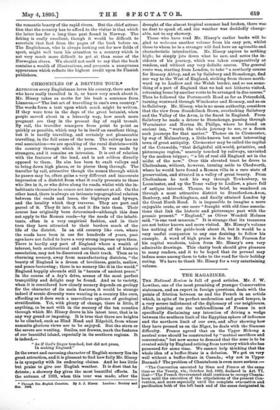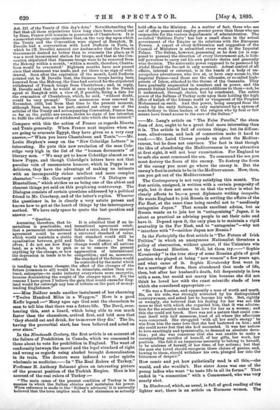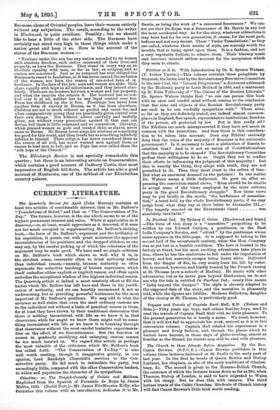THE MAGAZINES.
THE National Review is full of good articles. Mr. J. W. Lowther, one of the most promising of younger Conservative statesmen, and an expert in foreign questions, deals with the
points of friction between us and the French in an article which, in spite of its perfect moderation and good temper, is a very severe indictment of the diplomacy of our neighbours. After pointing out the unfriendliness of France in not specifically disclaiming any intention of driving a. wedge between the southern limit of the Egyptian sphere of influence and the northern limit of our own, and after showing how
they have pressed us on the Niger, he deals with the Siamese difficulty. France agreed that on the Upper Mekong a neutral zone should be constructed by "mutual sacrifices and concessions," but now seems to demand that the zone is to be created solely by England retiring from territory which she has possessed for some time. We cannot help thinking that the whole idea of a buffer-State is a delusion. We get on very well without a buffer-State in Canada; why not in Upper Burmah P The problem of Chantaboon is even more serious :-•-• "The Convention executed by Siam and France at the same time as the Treaty, viz., October 3rd, 1893, declared in Art. VI. that—' TheFrench Government shall continue to occupy Chanta- boon until the execution of the stipulations of the present Con- vention, and more especially until the complete evacuation and pacification both of the left bank and of the zones designated ill Art. III. of the Treaty of this day's date.' Notwithstanding the fact that all these stipulations have long since been carried out by Siam, France still remains in possession of Chantaboon. It is a somewhat singular coincidence that, on the very day upon which the Treaty and the Convention were signed at Bangkok, M. Develle had a conversation with Lord Dufferin in Paris, iu which he (M. Develle) assured our Ambassador that the French Government desired no better than to evacuate the place, as it was a most inconvenient station for troops, and that as the Con- vention stipulated that Siamese troops were to be removed from the Mekong within a month, within a month, therefore, Chanta- boon would be evacuated.' Eighteen months have now passed since that statement was made, and yet there is no sign of with- drawal. Soon after the expiration of the month, Lord Dufferin pointed out to M. Develle that, the Siamese troops having been removed from the Mekong, the time had arrived for the stipulated withdrawal of French troops from Chantaboon ; and, in reply, M. Develle said that he would at once telegraph to the French agent at Bangkok with a view of, if possible, fixing a date for the evacuation of Chantaboon, which, he said, without doubt, would be very prompt.' These assurances were renewed in November, 1893, but from that time to the present moment, although Siam has, on her part, carried out every one of the articles c.,f the Treaty and accompanying Convention, France has, PO far as the public are aware, shown no signs of her intention to fulfil the obligation of withdrawal into which she has entered."
Compare with this the action of France as regards Biserta and Tunis generally. When France next inquires when we are going to evacuate Egypt, they have given us a very easy answer,—" When you leave Chantaboon and Tunis."—Mr. Leslie Stephen's essay on the "New Coleridge Letters" is interesting. He puts this new revelation of the man Cole- ridge very high in the list of the "human documents" of literary men. "We may get to know Coleridge almost as we know Pepys, and though Coleridge's letters have not that peculiar vein of unconscious humour, which in Pepys is so delicious, they have the advantage of making us intimate with an incomparably richer intellect and more complex character."—Mr. Courtney contributes "A Dialogue on Bimetallism," which strikes us as being one of the ablest and clearest things yet said on this perplexing controversy. The Dialogue consists of certain questions addressed by a political friend to Mr. Courtney, and of the latter's replies. Whoever the questioner is, he is clearly a very astute person and knows how to get at the heart of things by the interrogatory method. We have only space to quote the last question and answer :— " Question.
Assuming, therefore, that bi- metallism is practicable, and that a permanent international agreement could be secured which would maintain a stable equalization between gold and silver, I do not see how Eng- land, as a whole, is to gain anything by the change, or how the depression in trade is to be relieved.
be controlled by the metal which is tending to become cheaper, the effect of the changes of the future (common to all) would be to stimulate, rather than con- tract, enterprise—to make industry everywhere more energetic, because diminishing the weight of the charges upon it. For the reasons I have given I believe the gain that would ensue for Eng- land would far outweigh any loss of tribute on the part of money- lending Englishmen."
—Miss Balfour sends another instalment of her charming "Twelve Hundred Miles in a Waggon." Here is a good Kaffir legend :—" Many ages ago God sent the chameleon to man to tell him that there was a future life. The Devil, over- hearing this, sent a lizard, which being able to run much faster than the chameleon, arrived first, and told men that 'they should eat and drink, for to-morrow they die.' The lie, having the proverbial start, has been believed and acted on ever since."
In the Nineteenth Century, the first article is an account of the failure of Prohibition in Canada, which we commend to
those about to vote for prohibition in England. The want of conformity between the moral and the legal standard of right and wrong as regards using alcohol brought demoralisation in its train. The doctors were induced to order spirits wholesale as medicine.—In "The Real Rulers of Turkey,"
Professor H. Anthony Salmone gives an interesting picture of the present position of the Turkish Empire. Here is his account of the real rulers of Turkey :—
"The main cause of the present condition of Turkey is the manner in which the Sultan obtains and maintains his power. When reference is made to the Sultan's advisers,' it is naturally believed that the term implies such of his statesmen as actually
Answer.
It is admitted that if an in- ternational agreement estab- lished a ratio, and thus ensured a universal standard of value, that standard would still be liable to change ; but the change would affect all nations so as to remove the present aggravation of international competition ; and as, moreover, the standard of the future would hold office in the Ministry. As a matter of fact, those who are out of office possess and employ greater power than those who are responsible for the various departments of administration. The so-called' Sublime Porte' has but a small share in the actual government of the Empire or its relations with the European Powers. A report of every deliberation and suggestion of the Council of Ministers is submitted every week to the Imperial Palace. The Sultan, however, possessing as he does (or is sup- posed to possess) the direction of every Government act, is him- self powerless to carry out his own private desire and generally wise decision. The autocratic power supposed to be possessed by Abdul Hamid the Sec3nd is only nominal. Actual control of all affairs, internal or external, is in the hands of a body of un- scrupulous adventurers, who live at, or have easy access to, the Imperial Palace—and these are the ullemahs, or so-called high- priests of Islam, attached to the throne of the Osmanlis. They have gradually augmented in numbers and in power, and the present Sultan himself has made great additions to them—not, be it understood, through choice, but by constraint. The entire power of the Sultans of Turkey rests upon their holding the high office of kaliph of the Islamic world or vicegerent of the Prophet Muhammad on earth. And this power, being usurped from the Arabs by the early Sultans, is only maintained by a system of semi-bribery to those leaders of the religion who by foul or fair means have found access to the ears of the Sultan."
Mr. Lang's article on "The False Pacelle," the sham Joan of Arc, ought to be a great deal more interesting than it is. The article is full of curious things; but its diffuse- ness, allusiveness, and lack of connection make it hard to read.—Mr. Laird Clowes pounds on about the Mediter- ranean, but he does not convince. The fact is that though the idea of abandoning the Mediterranean is very attractive at first sight, it will not bear examination. For England to be safe she must command the sea. To command the sea you must destroy the fleets of the enemy. To destroy the fleets of the enemy you must go where the enemy is. But the enemy's fleet is certain to be in the Mediterranean. How, then, can you get out of the Mediterranean?
The Contemporary is not very satisfying this month. The first article, unsigned, is written with a certain pomposity of style, but it does not seem to us that the writer is what he clearly affects to be,—a. great diplomate writing incognito. He wants England to join Russia in settling the affairs of the Far East, at the same time being careful not to "needlessly antagonise Japan." That sounds excellent advice, but as - Russia wants us to join her in "antagonising" Japan, it is
about as practical as advising people to eat their cake and have it. Depend upon it, the only plan is to maintain a rigid neutrality in the Far East, and to "antagonise "—why not "interfere with "F—neither Japan nor Russia P
In the Fortnightly the first article is "The Future of Irish Politics," in which an anonymous Nationalist threatens a policy of obstruction, without quarter, if the Unionists win at the General Election. Well, let them try.—" Sophie Kovalevsky " is the true story of some Russian girls of good position who played at being "new women" a few years ago, and what came of it. Sophie Kovalevsky first went in for a marriage of form, then abandoned that mode of life, then, but after her husband's death, fell desperately in love with a man, but would not marry him because she did not think he loved her with the exact scientific shade of love which she considered appropriate :— " He was a Russian, and apparently a man of worth and merit. He, on his side, was strongly attracted by his distinguished countrywoman, and asked her to become his wife. But, rightly or wrongly, she believed that his feeling for her was not the same as that with which she regarded him, that it was admira- tion for the scientist rather than love for her as a woman ; and this she could not brook. Hers was not a nature that could con- tent itself with half measures, least of all where the affections were concerned. She struggled with all her soul's energy' to win from him the same love that she had bestowed on him ; and she could never feel that she had succeeded. It was her nature to love exactingly and tyrannically, to demand an absolute devo- tion ; yet she was conscious that she was unable to make a corresponding sacrifice of herself, of her gifts, her work, her position. She felt it an imperious necessity to belong to herself, to be mistress of herself, of her time, of her actions; but that the man she loved should recognise these claims of genius, and, bowing to them, should withdraw his own, plunged her into the bitterness of despair."
How comic and yet how pathetically mad is all this,—she
would, and she wouldn't. Her sister Anna was one of the young ladies who want "to taste life in all its forms." That ended in "a connection" with a Communard, who was very nearly shot.
In Blackwood, which, as usual, is full of good reading of the lighter sort, there is an article on Burmese women. The Burmese, alone of Oriental peoples, leave their women entirely without any subjection. The result, according to the writer in Blackwood, is quite excellent. Possibly ; but we should like to hear a little of the other side. The Burmese have certainly not stood very high in those things which make a nation great and keep it so. Here is the account of the status of the Burmese woman :—
" Nowhere under the sun has any nation accorded to its women such absolute freedom, such entire command of their lives and property, as have the Burmese. They stand in every way on an absolute equality with men, as far as law, as religion, and as custom are concerned. Just as no conquest has ever obliged the Burmese to resort to feudalism, so it has never caused the seclusion of the women, nor been the reason of one-sided laws of in heritance. In the face of the law, man and woman are alike. Girls share equally with boys in all inheritance, and they inherit abso- lutely. There are no trustees between a woman and her property, and when she marries she retains it. Her husband has no con- trol over it at all, neither has he any legal control over her. From her childhood up she is free. Parentage has never been another form of slavery in Burma, as it has been elsewhere. Children are not so much ordered as guided and cared for, and when comparatively young they are practically given control over their own doings. Not without advice carefully and usefully given, not without every precaution against ill that care can devise, but there is little command and no compulsion. Chivalry, which praised women as gods and treated them as slaves, never came to Burma. No Burma lover sings his mistress as something too good for this world, and then treats her as something infinitely inferior to himself. Their religion has never considered them as the source of all evil, has never warned man against them as snares to lead men to hell, and no Pope has ever called them the sole hope of the Church.'" The Edinburgh Review is not specially remarkable this quarter ; but there is an interesting article on Somersetshire, which contains a good account of Cadbury Castle, that most impressive of English hill-forts. The article has also a good account of Montacute, one of the noblest of our Elizabethan country palaces.








































 Previous page
Previous page